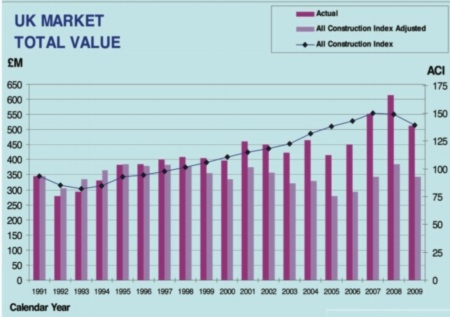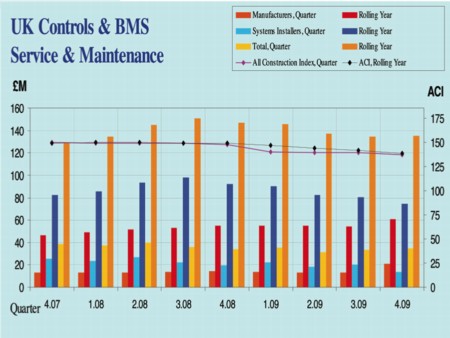BMS and controls industry is weathering the recession well

BCIA figures reflect market downturn, but members are weathering the recession well, and are prepared to come out of the recession in good shape.
After rising to a record high in 2008, the marketing information service of the Building Controls Industry Association (BCIA) shows that the controls industry is feeling the effects of the economic downturn. Figures for 2009 show that the value of products, installed systems and maintenance for the calendar year totalled £513 million. This represents a 10.5% decrease in real terms (i.e. adjusted for the Government’s Output Price Index for All New Construction) from 2008 — when the market reached a 5-year high, a growth in real terms of 13.1%.
However, closer analysis of the figures, gathered exclusively by the BCIA from its membership, indicates that the UK controls sector has retained its fundamental strength. Although the intrinsic value of the market (based on total product supplied and maintenance revenues but exclusive of system installation) has dropped by 8.4% since 2008 to £235 million, in real terms this is still the second highest actual level achieved since BCIA records began in 1991.
Service and maintenance have experienced a smaller decrease in revenues, 7.9%, putting the total value for service and maintenance at £135 million. This reflects the shift towards maintaining existing controls systems rather than installing new equipment. There is also a growing awareness that well-maintained building controls can help to save energy and keep business costs down in the long-term.
There is no escaping the fact that the controls and BMS industry has been affected by the recession, along with the rest of construction. But BCIA members appear to have weathered the storm better than other parts of the industry. A major reason is increasing awareness in business of the importance of energy saving and the money that can be saved on energy bills.
James Smith, director of BCIA member company BMS Solutions says: ‘The controls market has seen a downturn over the last eight months, and margins have suffered. But recently we have seen a large growth of around 20% in our service and maintenance business. We have found that there is a lot of interest in our energy services and consultancy on carbon reduction.’
Ian Ellis, marketing manager for Siemens Building Technologies and president of the BCIA, agrees that the market has slowed with the recession. ‘But not as much as we had been expecting. Predictions were bad, but the reality has not been as painful as expected. The market has held up well for us, particularly as a lot of projects were already underway.’
Ellis sees energy issues as an important factor for growth in the controls sector. ‘The introduction of the Carbon Reduction Commitment has been important for us. People are certainly becoming more concerned about energy use in commercial buildings. The recession has also had the effect of making businesses much more aware of their energy costs — something that may not have been noticed when the economy was booming. We have certainly seen a lot of building managers investing in upgrades or maintenance of their controls systems, as a way of improving building energy efficiency,’ says Ellis.
James Smith agrees that energy management is a positive market development for the controls sector. ‘The Carbon Reduction Commitment is causing the larger companies such as the big banks to pay more attention to energy saving, because they are very concerned about the league tables. I would say though that the medium-sized companies have yet to take proper notice of the CRC.’

Another factor affecting the market in April 2010 was the forthcoming General Election. The construction industry as a whole was waiting to see what the effects on public spending will be and whether work will continue or dry up.
However, Ellis commented: ‘Like most of the construction industry, the public sector has been a good source of business; that could change after the election. We would certainly say though, that if the public sector is looking to save money, then energy in buildings is an excellent place to start. Building controls offer a very cost-effective solution, and sensible controls strategies can cut energy bills by anything up to 30%.’
For both companies, the future lies with offering expert advice on saving energy and helping to counteract ever-rising energy costs for business. Smith says: ‘BMS Solutions has been part of Centrica since July 2009, and this has enabled us to explore business avenues in the area of energy efficiency.
Siemens too regards this as an important strategy for the future: ‘Energy use is affected by many factors, not only HVAC but also lighting. We are working to ensure we can offer energy control, monitoring and management across all these areas.’
On a positive note, the commercial property market seems to be moving forward again. ‘We are seeing that the large property developers are releasing some of the projects that had been on hold. Of course, there are more people tendering for the work so that means we have to be more competitive,’ says Smith.







